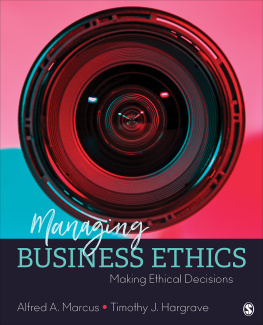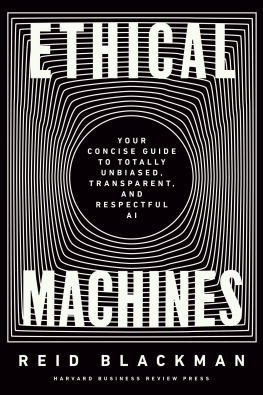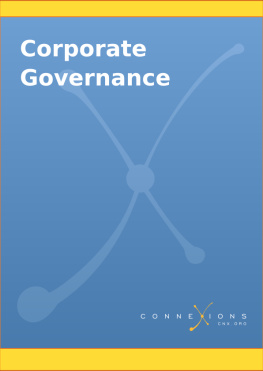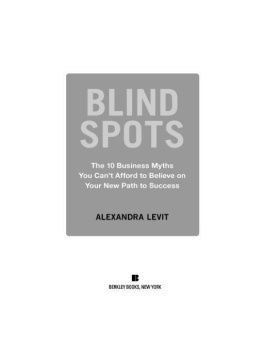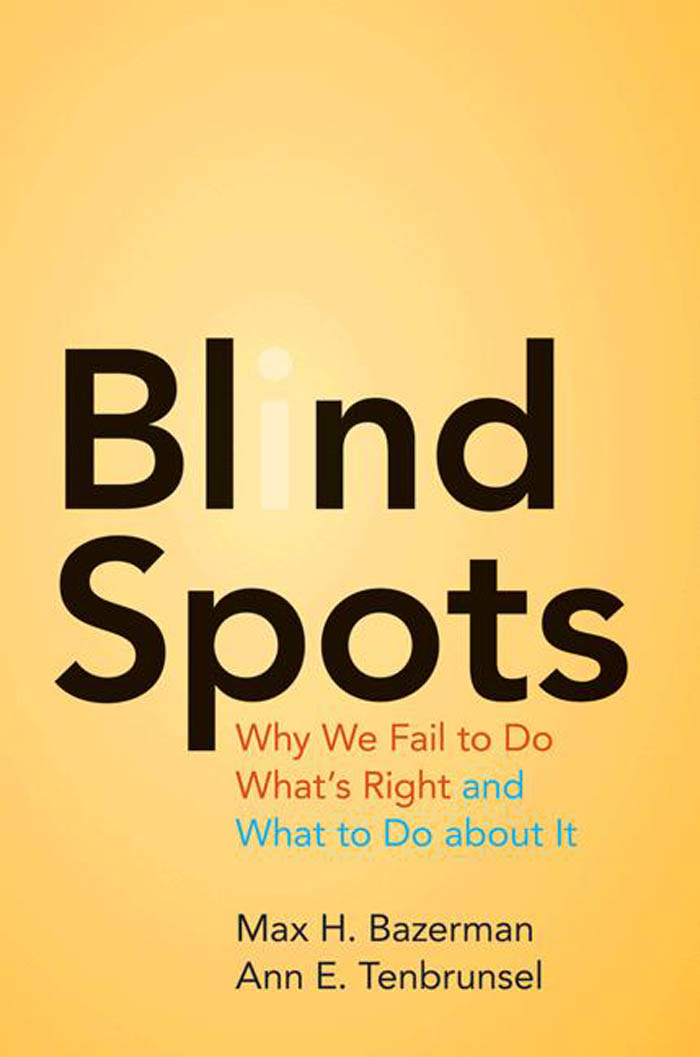Bl i nd Spots
Bl i nd Spots
Why We Fail to Do Whats Right and What to Do about It
Max H. Bazerman
Ann E. Tenbrunsel
Princeton University Press
Princeton and Oxford
Copyright 2011 by Princeton University Press
Published by Princeton University Press, 41 William Street,
Princeton, New Jersey 08540
In the United Kingdom: Princeton University Press, 6 Oxford Street,
Woodstock, Oxfordshire OX20 1TW
press.princeton.edu
All Rights Reserved
Library of Congress Cataloging-in-Publication Data
Bazerman, Max H.
Blind spots : why we fail to do whats right and what to do about it / Max H. Bazerman, Ann E. Tenbrunsel.
p. cm.
Includes bibliographical references and index.
ISBN 978-0-691-14750-5 (cloth : alk. paper) 1. Business ethics. 2. Corporate culture.
3. Decision makingSocial aspects. I. Tenbrunsel, Ann E. II. Title.
HF5387.B39 2011
174.4dc22 2010046640
British Library Cataloging-in-Publication Data is available
This book has been composed in Scala and Avenir
Printed on acid-free paper
Printed in the United States of America
10 9 8 7 6 5 4 3 2 1
This book is dedicated to Dave Messick, whose ideas inspired us to study behavioral ethics, even before behavioral ethics had a name.
Contents
Acknowledgments
We have been working on this book for the last two decadesthough we didnt know this for much of the time. In 1991, Ann entered the doctoral program at Northwestern Universitys Kellogg School of Management and spent much of her time there doing some of the early research that brought psychology into the realm of business ethics. Central to this work was Anns collaboration with David Messick, who arrived at about the same time, as the first Kaplan Distinguished Professor of Ethics at Kellogg. Their work examined ethical fading, or the tendency for otherwise ethical people to make unethical decisions because the ethical implications have faded from their decisions. Max connected with Ann and Dave on some of this research, but was largely an observer and fan of this work.
In 2000, Max joined the Harvard University faculty and started conducting research with new colleagues Mahzarin Banaji and Dolly Chugh on what we called bounded ethicality, or the systematic ways in which people engage in unethical behavior without their own awareness. The ideas that resulted from this collaboration, together with those from Dave and Anns collaboration, proliferate throughout this book.
At about the same time, Enron collapsed, and organizations and business schools were pushed to do something about the erosion of ethics in society. Consequently, the field of business ethics started to shift in ways that are described throughout our book. One core shift was the development of the field of behavioral ethics, which focuses on the psychology of how real people act in ethical contexts. Interest in behavioral ethics has grown exponentially over the past decade, and this burst of interest prompted us to combine our view of behavioral ethics in this book.
Our work on ethics has been affected by our interactions and collaborations with many scholars. Some of these scholars include Modupe Akinola, Mahzarin Banaji, Iris Bohnet, Art Brief, Daylian Cain, Eugene Caruso, Suzanne Chan-Serafin, Dolly Chugh, Luke Coffman, John Darley, David de Cremer, Tina Diekmann, Nick Epley, Francesca Gino, Josh Greene, Jennifer Jordan, Karim Kassam, Rod Kramer, Marijke Leliveld, George Loewenstein, Kathleen McGinn, David Messick, Katy Milkman, Celia Moore, Don Moore, Charles Naquin, Maggie Neale, Greg North-craft, Neeru Paharia, Madan Pillutla, Todd Rogers, Lisa Shu, Kristin Smith-Crowe, Phil Tetlock, Chia-Jung Tsay, Elizabeth Umphress, Erik van Dijk, Kimberly Wade-Benzoni, and other coauthors and friends whom we will be embarrassed for forgetting later.
The quality and presentation of the ideas in this book was dramatically affected by a number of people. Art Brief, Dolly Chugh, Kristina Diekmann, Francesca Gino, Josh Greene, Dave Messick, Madan Pillutla, Todd Rogers, and Kristin Smith-Crowe read and provided insightful feedback on an earlier draft of the manuscript. The book is far better as a result. We also benefited from fantastic editorial help. Katie Shonk, Maxs longtime research assistant, coauthor, and editor, made each and every sentence better, as she always does (if you like the writing, get a copy of Katies new novel, Happy Now?). Her help was invaluable. Sarah Oliver-Johnson provided the wonderful illustrations of the trolley and footbridge problems. Ranjan Ahuja proofread, error-checked, and generally fixed what needed to be fixed. Our editors at Princeton University Press, Eric Schwartz, Beth Clevenger, and Janie Chan, provided excellent guidance throughout and added great value. Finally, we thank our familiesMaxs wife, Marla; Anns husband, Dante; her children, Dante, Lina, and Michel; and her dad, Donfor their support as we wrote the book.
Bl i nd Spots
Chapter 1
The Gap between Intended and Actual Ethical Behavior
For some reason I cant explain, I know St. Peter wont call my name.
Viva La Vida, Coldplay
How ethical do you think you are compared to other readers of this book? On a scale of 0 to 100, rate yourself relative to the other readers. If you believe you are the most ethical person in this group, give yourself a score of 100. If you think youre the least ethical person in this group, give yourself a score of 0. If you are average, give yourself a score of 50. Now, if you are part of an organization, also rate your organization: On a scale of 0 to 100, how ethical is it compared to other organizations?
How did you and your organization do? If youre like most of the people weve asked, each of your scores is higher than 50. If we averaged the scores of those reading this book, we guess that it would probably be around 75. Yet that cant actually be the case; as we told you, the average score would have to be 50. Some of you must be overestimating your ethicality relative to others. Its likely that most of us overestimate our ethicality at one point or another. In effect, we are unaware of the gap between how ethical we think we are and how ethical we truly are.
This book aims to alert you to your ethical blind spots so that you are aware of that gapthe gap between who you want to be and the person you actually are. In addition, by clearing away your organizational and societal blind spots, you will be able to close the gap between the organization you actually belong to and your ideal organization. This, in turn, will help us all to narrow the gap between the society we want to live in and the one in which we find ourselves. Drawing on the burgeoning field of behavioral ethics, which examines how and why people behave the way they do in the face of ethical dilemmas, we will make you aware of your ethical blind spots and suggest ways to remove them.
Behavioral Ethics: A New Way of Understanding Unethical Behavior
Consider these two opinions regarding responsibility for the financial crisis that began in 2008:
This recession was not caused by a normal downturn in the business cycle. It was caused by a perfect storm of irresponsibility and poor decision-making that stretched from Wall Street to Washington to Main Street.
President Barack Obama
The mistakes were systemicthe product of the nature of the banking business in an environment shaped by low interest rates and deregulation rather than the antics of crooks and fools.
Richard Posner


